Kenya and the Global Fund and UNAIDS Signal Partnership
01 July 2013
NAIROBI, Kenya – In a joint visit to Kenya, the leaders of the Joint United Nations Programme on HIV/AIDS (UNAIDS) and the Global Fund to Fight AIDS, Tuberculosis and Malaria signalled strong partnership to defeat infectious diseases including HIV and TB.
Mark Dybul, Executive Director of the Global Fund, and Michel Sidibe, Executive Director of UNAIDS, met with leaders in Kenya’s new government, as well as Civil Society Organizations and other partners.
At a signing ceremony in Nairobi, two new grant agreements demonstrated a commitment to work together with partners. The grants, worth US$27 million, will support programs implemented jointly by the Ministry of Finance of Kenya and by AMREF, a civil society organization that has been working improving the health of African communities for over 50 years.
“In Kenya, and in other countries, the most effective prevention often comes by reaching those most vulnerable to infection,” said Dr. Dybul. “We can be most effective when all partners are moving in the same direction.”
The new grants will support programs that improve the quality of diagnosis and treatment of tuberculosis, reduce diagnostic delays in vulnerable populations, and provide nutritional support to TB patients. They will also cover TB/HIV co-infected patients and particularly vulnerable populations, including prisoners, people living in informal settlements and mobile populations.
“Kenya can have a profound effect on the AIDS response if it continues to lead in a people-centred approach to health” said Mr. Sidibe. “If all people in Kenya can access essential health services with dignity and without fear – then surely this country can tip the balance of the epidemic in Africa.”
The UNAIDS Country office spent $420,000 on GFATM related work since 2010 with a focus on supporting the governance and oversight of the Kenya Coordinating Mechanism, as well as through technical support for the development of future grants and unblocking barriers in the flow of funds. UNAIDS’ technical support helped to ensure the successful agreement between the Government of Kenya and the Global Fund for the implementation of its Round 10 grants of US$483 million.
UNAIDS, the Global Fund and PEPFAR are working closely to support the Government of Kenya to eliminate new HIV infections among children and keep their mothers alive. Since 2009, Kenya has reduced new infections among children by 44 percent but still reported 13,000 new infections among children in 2012.
Kenya is ranked 13th among the 22 high-burden TB countries in the world. Since 1990, the absolute number of TB cases notified increased ten-fold in Kenya, as the TB case notification rates for all cases in Kenya has increased from below 50 per 100,000 in 1990 to 329 per 100,000 people in 2008. The HIV epidemic is the most significant driver of the increase in the TB burden in Kenya. In 2008, HIV testing among TB patients increased to 83 percent, with 45 percent being dually infected.







